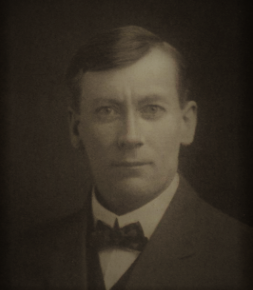Throughout the Western migration period, 1870-1914, newspapers and magazines in Iceland tried to bring the nation news of the Western emigrants in North America. Icelandic settlers in North America contributed, sending letters to relatives and friends in which they described to the best of their ability their attempts to establish a foothold in a foreign country, to be participants in the formation of a new nation. Little by little, an Icelandic community took shape in North America with its own church synod, newspapers and magazines in Icelandic, and an ambition to maintain the Icelandic heritage away from the old country. The editors of Lögberg and Heimskringla, the newspapers in Winnipeg, were mostly aware of the problem, drew a picture of the main issues in their writings, as both papers were widely read in the West as well as in Iceland. In 1904 a young theologian came to Winnipeg. His name was Stefán Björnsson, he had just graduated from Reykjavík Theological Seminary and a year later he was hired as Lögberg’s editor. Baldur Sveinsson, a student, went west to Winnipeg from Eskifjörður in 1907 and during a walk around the city he ran into Stefán, they had known each other since their student years in Reykjavík. In an article published in Óðinn in Reykjavík in 1913, Baldur tells of his acquaintance with Stefán, let’s look at his writings:
Stefán Björnsson 
Editor of Lögberg
“It is a lot of work, and not without problems, to be the editor of the largest Icelandic newspaper in the world. This time Óðinn presents the image of the man who has held that job for several years. It is Stefán Björnsson cand. theol, Lögberg’s editor. As is known, Lögberg is published in Winnipeg. It is by far the largest of all Icelandic newspapers; it comes out once a week and each paper is 8 pages. It was from the beginning much larger than the Icelandic papers and has been enlarged more than once – last in 1911. These were its editors before Stefán: Einar Hjörleifsson, Jón Ólafsson, Sigtryggur Jónasson, and Magnús Paulson. The paper follows the policy of the Liberal Party in Canada, and several Icelanders in Winnipeg own it.”
Origin and ancestry
“Stefán Björnsson was born at Kolfreyjustaðir on the 14th day of March in 1876. He completed his matriculation exam in Reykjavík in 1900, and his official exam at the seminary three years later. In 1904 he went to the West and became the editor of Lögberg a good year later. His wife is Helga Jónsdóttir from Rauðseyjar in Breiðafjörður. Stefán is of course from good stock. His father is the famous farmer Björn in Dalur in Fáskrúðsfjörður, Stefánsson, agent from Snartastaðir in Núpssveit, Jónsson, priest in Helgastaðir, from Kolbein’s family in Stóruvellir, from which many great men have descended. Margrjet, editor Stefán’s mother, was Stefánsdóttir, last priest at Kolfreyjustaðir, Jónsson, Guðmundsson, priest at Hjaltastad, half-brother of Benedikt Gröndal assessor and Rev. Þórarinn of Múla, but those brothers were the sons of Jón, the priest at Mývatn, Þórarinsson, priest Jónsson, priest in Stærra-Árskóg (D. 1696), who was both a poet and a remarkable man, Guðmundsson. On his mother’s side, priest Stefán Jónsson was descended from the Sauðaness priests, the Scheving family and the Reynistaðir family, who are descended from Bjarni Halldórsson, the sheriff of Þingeyri, and Páll Vídalín, a lawyer.”
Excellent ability
“I barely knew Stefán at school, but when I came to Winnipeg, I met him by chance on the street and took him in my arms as his brother and he invited me to stay at his home as long as I wanted. I stayed with him in the best of spirits for half a month, but a year later I became his colleague at Lögberg and we got to know each other much better. I often marveled at his hard work and endurance, and I think few people can match him in that. He has always done the most good for me. He has always made the greatest efforts to improve the publication of the newspaper as much as possible, and Icelandic journalism in the West took a big and good turn when he became Lögberg’s editor, because then the quarrels that had previously existed between the editors were greatly reduced. Since then, the Western newspapers have always referred to the local newspapers in a polite way of writing. Although there are many and big controversies, Stefán has defended his cause with calm arguments and genteel writing style, as befits an educated man, and his opponents have appreciated that. Everyone remembers one thing, that he is a man who does not offend others at first sight. He is very determined and sticks to his cause, whether there are more or less who agree.”
True patriotism
“I have known few men who have such a warm heart for Iceland as he does, but he does not talk a lot about his patriotism, neither in speech nor in writing. But he has proved to be a valiant man in action for our nation, if accidents have befallen them, and is the last one to mention the great gifts that were collected west of the sea last year to help those women who lost their men at sea last year. He supported that effort wholeheartedly, but of course many more supported them. And many times before, he had given our nation a lot of help in times of need. As you can see from the attached photo, Stefán is a handsome man. He is tall and well-built. During his student years, he did wrestling and other sports and he was one of the best wrestlers in school in his time. He also dabbled in fiction in those years and was well-regarded, but now he has given up that art, so to speak. Stefán is slow to speak and aloof at first and does not seek friendship of men. But he is happy in his group and eloquent, loyal and helpful, if he is asked. I have never met a more thoughtful collaborator. He is a great magistrate and has come into good fortune, as he has little in comparison with the rich people from the group of Icelanders west of the sea of whom Óðinn has previously pictured. If I could decide, I would get Stefán some confidential work in this country, because I know he would be a great benefit to his people.” Baldur Sveinsson
English version by Thor group.
